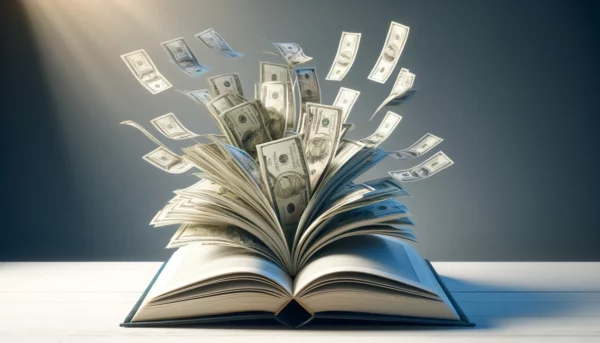
The allure of writing towards a billion-dollar fortune captivates many, conjuring images of authors whose words have not only touched the world but also amassed fortunes. This concept stretches beyond mere bestsellers, delving into the rarefied realm where storytelling and strategic savvy converge to yield wealth of staggering proportions. Yet, the journey from penning narratives to banking billions is fraught with speculation and skepticism. Can this solitary act truly unlock the doors to a billionaire’s club, traditionally reserved for industrial magnates and tech visionaries?
This article embarks on an exploration of this intriguing possibility, weaving through the tales of those who’ve come close and dissecting the myriad factors that contribute to such unparalleled success. As we write, we delve into this debate space, we unravel the complexities of translating literary acclaim into a financial windfall, setting the stage for a deeper investigation into this mythical echelon.
Start Your Publishing Journey FOR FREEUnderstanding ‘A Billion’
Grasping the sheer magnitude of ‘a billion’ is pivotal when discussing wealth, especially in the realm of writing. Traditionally, the term ‘billion’ has been subject to two main interpretations: the long scale, where a billion equates to a million million (1,000,000,000,000), prevalent in parts of Europe; and the more widely adopted short scale, where it stands for a thousand million (1,000,000,000).
In scientific notation, a billion dollars is expressed as 1 x 10⁹, showcasing its vastness through the power of large numbers of exponents. Understanding this numerical giant is crucial when contemplating the journey to amassing such wealth. A billion is not merely a number; it represents a significant economic milestone, embodying a scale of success that few achieve. Recognizing its size and significance lays the groundwork for appreciating this extraordinary achievement, setting a perspective on the challenges and triumphs that lie in weaving words into wealth.
Billion Dollar Writing
Achieving a billion-dollar fortune through writing is an exceptional, albeit rare, feat. As we delve into the captivating possibility of transforming literary talent into staggering wealth, we will examine the success stories of literary giants like J.K. Rowling and George R.R. Martin, whose imaginative worlds and strategic ventures have flirted with the billion-dollar mark. By exploring diverse income streams such as adaptations, digital content, and merchandise, it becomes clear that reaching such financial zeniths involves a blend of creativity, market acumen, and strategic brand expansion.
Despite the allure, the journey to a billion remains a daunting challenge, fraught with market saturation and changing consumer preferences. While the dream captivates many, the true value of writing lies in its power to connect, inspire, and create lasting impact, transcending mere financial gain.
The Realm of Billion-Dollar Writing
This domain, while rarefied, isn’t entirely devoid of inhabitants. Historically, for example, literary giants like Charles Dickens and William Shakespeare amassed fortunes that, when adjusted for inflation, hint at the potential financial windfalls of prolific penmanship. In contemporary times, figures such as J.K. Rowling and James Patterson have become household names, not just for their compelling narratives but also for their substantial earnings, often flirting with the one billion hundred-dollar mark through an amalgamation of book sales, adaptations, and merchandise.
Expanding Horizons
Writing can transcend traditional book publishing, branching into lucrative realms like screenwriting and digital content creation. Screenplays that morph into blockbuster hits or TV series can unlock significant earnings through sales and rights. Similarly, the digital landscape offers fertile ground for authors to thrive financially. Blogs turn into revenue streams through advertisements, sponsorships, and direct sales, bypassing conventional publishing barriers. Online courses further allow a writer to capitalize on their expertise, reaching a global audience willing to pay for knowledge.
These avenues highlight a dynamic shift in how they can achieve financial success, emphasizing adaptability and a keen understanding of audience engagement across various platforms. In this digital age, the potential for a writer to generate wealth is only limited by their ability to navigate and harness the myriad opportunities beyond the printed page.
Key Factors
Key factors underpinning this monumental success include an expansive and engaged audience, often cultivated through relatable characters, universal themes, or innovative narratives. Genre plays a significant role, with certain genres like fantasy, mystery, and self-help demonstrating broader commercial appeal. Crucially, adaptation rights can exponentially increase a writer’s earnings, with film, television, and even video game adaptations providing substantial revenue streams.
Therefore, achieving wealth from your writing goes beyond raw talent, embracing the strategic choice of genre, cultivating audience connections, and astute rights negotiations. It’s a confluence of creativity, understanding book marketing, and sometimes, fortuitous timing, that propels a writer from mere literary success to financial zenith.
The Economics of Writing
The economics, while varied, often presents a stark contrast to the dazzling heights of billion-dollar success stories.
Dissecting a Writer’s Earnings
Typically, a writer’s earnings can be dissected into advances, royalties, and, occasionally, adaptation rights. Advances against royalties are upfront payments made by publishers, which can range from a few thousand dollars for debut authors to millions of dollars for established bestsellers. Royalties, a percentage of book sales, typically range from 5% to 15% for print books and can be higher for e-books. The golden ticket, however, often lies in the form of adaptation rights — selling the rights for books to be turned into films, series, or even games, which can fetch significant sums of money and ongoing revenue from box office shares or streaming services.
Start Your Publishing Journey FOR FREEThe Rarity of Billion-Dollar Success
Despite these avenues for income, reaching the elusive one-billion-dollar mark remains a rarity in the writing world. The journey to such financial zeniths is fraught with challenges, including market saturation, rapidly changing consumer preferences and the sheer unpredictability of what might resonate with audiences on a global scale.
Contrasting Industries
In contrast, other industries, particularly technology and finance, regularly herald the rise of new billionaires. Startups with innovative solutions or disruptive business models can achieve billion-dollar valuations in a relatively short time, a phenomenon known as reaching “unicorn” status in the venture capital world. These sectors benefit from scalable products and services that can rapidly expand across global markets, a leverage point often not as readily accessible in countries with the traditional written landscape.
This juxtaposition underscores the unique challenges within the realm of becoming a wealthy writer, where success is not solely measured by financial gain but also defined by the impact and reach of one’s words. While we imagine the dream that captivates many, the economic realities paint a picture of an industry where such feats are exceptional, celebrating the intrinsic value of storytelling and its profound influence on culture and society.
Challenges and Realities
In the digital age, writers navigate a confusing labyrinth of challenges that significantly impact their journey toward success, let alone the rarefied air of billionaire status. Market saturation stands as a formidable barrier, with millions of books published annually across the globe, diluting the impact of individual works and making standout success increasingly elusive. The digital realm, while democratizing access to publishing, has intensified this saturation, allowing virtually anyone to publish their work, thereby escalating the competition for readers’ attention.
Changing consumer preferences further compound these challenges. The digital era’s fast-paced nature has fostered a preference for bite-sized, easily digestible content, often at the expense of traditional long-form literature. This shift necessitates adaptability and innovation from writers, who must now engage audiences across various platforms and formats, from e-books and audiobooks to blogs and social media posts.
Given these formidable challenges, the probability of a writer achieving billionaire status through writing alone is exceedingly slim. The large number of instances where writers have reached such financial zeniths are outliers, often involving a fortuitous blend of exceptional talent, market trends alignment, and ancillary revenue streams like adaptations and merchandise. For most of them, the value of their craft transcends monetary gain, rooted instead in the joy of creation, the impact of their words, and the connections forged with readers worldwide.
Case Studies: Authors Who Made It Big
Among the pantheon, a large number of examples of authors who have not only made it big but also flirted with the billion-dollar echelon, J.K. Rowling and George R.R. Martin stand as quintessential examples.
J.K. Rowling
J.K. Rowling’s journey from a struggling single mother to the creator of the “Harry Potter” series is a testament to the transformative power of imagination and perseverance. Her writing, characterized by intricate plotting, rich world-building, and universal themes of love, friendship, and courage, resonated with a global audience, transcending age and cultural barriers. The series’ success was not confined to book sales alone; it spawned a multi-billion-dollar franchise encompassing movies, theme parks, merchandise, and plays, creating a perennial revenue stream that propelled Rowling toward billionaire status.
George R.R. Martin
George R.R. Martin, the architect of the “A Song of Ice and Fire” series, which was adapted into the wildly successful television series “Game of Thrones,” showcases another path to monumental success. Martin’s gritty, complex narrative and willingness to subvert traditional fantasy tropes captivated millions. His deep, character-driven storytelling fostered intense audience engagement, consistent with fans passionately discussing theories and future plotlines. The television adaptation expanded his audience exponentially, further bolstered by merchandise, spin-offs, and speaking engagements, illustrating how adaptation rights can significantly amplify a writer’s earnings and influence.
Both Rowling and Martin underscore the potential to not just reach but captivate a global audience, generating wealth through a combination of book sales, adaptations, and an engaged, ever-expanding fan base. Their journeys highlight the synergy between compelling storytelling and strategic brand expansion in achieving unparalleled success in the literary world.
Beyond the Billion: Passion and Perseverance
This exploration has unveiled the colossal magnitude of a billion, the rare but possible financial zeniths within the literary world, and the multifaceted channels through which writers can cultivate wealth. We’ve traversed the economic landscapes of writing, confronted the digital age’s challenges, and celebrated the exceptional journeys of writers who’ve made an indelible mark. The quest for billion-dollar success, while daunting, underscores the boundless potential of the written word.
For aspiring writers who may think the odds are against them, let this reflection be a beacon—not of a pursuit for wealth, but a testament to the enduring power of passion, creativity, and perseverance. In the realm of writing, these are the true currencies of immeasurable value.
Concluding our dive into the realms of “Billion Dollar Writing,” it’s clear that reaching the pinnacle of literary success is a multifaceted endeavor, blending creativity, audience engagement, and strategic marketing. In this context, Spines emerges as a crucial ally for authors poised on the brink of publishing greatness. Embrace the future with Spines, where our AI-driven platform seamlessly integrates into the narrative of aspiring billion-dollar writers, offering end-to-end services from editing to marketing. With Spines, your journey from manuscript to masterpiece is not just about overcoming publishing hurdles but transcending them, ensuring your writing not only reaches its audience but leaves an indelible mark on the literary landscape. Sign up for free today.
Start Your Publishing Journey FOR FREE








